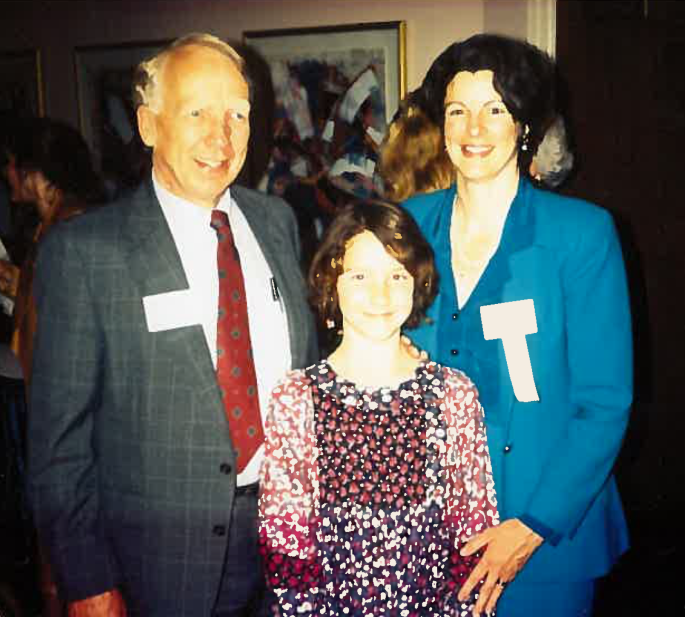In Memoriam: E. Clinton Bamberger Jr. (1926-2017)
March 10, 2017 by bmc85
by Brendan Kearney

From left to right: Clinton Bamberger, Author’s sister, Author’s mother. Photo provided by Author.
Growing up in Baltimore, I attended Corpus Christi, a liberal outpost of the Catholic Church led during my childhood by a nun and then by a former Federal Communications Commission lawyer turned priest. After Mass, my mom would chat with other parishioners, and one of her favorites was a kindly older gentleman named Clinton Bamberger L’51. I liked him, too: he had an easy manner, spoke slowly and deeply, and one day, taught me a “secret” handshake, my memory of which he tested each time we crossed paths. I’m not sure where it came from, but the sequential combination of handholds and gestures made me feel like I had a special bond with an important man.
Over the years, my mom told me about things Mr. Bamberger had done, like help run the Legal Services Corporation and travel the world teaching law. I remember Mr. Bamberger himself telling me about his time at Piper & Marbury, when it was only a dozen or so lawyers, a far cry from the international behemoth DLA Piper is today. I came to understand that Mr. Bamberger had lived a full and admirable life. But I didn’t grasp the full measure of it until he died last month.
I read The Baltimore Sun obituary,[1] then the one in The New York Times[2] and The Washington Post.[3] Somehow, I was unfamiliar with Mr. Bamberger’s most famous representation: that of John Brady before the U.S. Supreme Court after Brady had been convicted of murder and sentenced to death. It’s quite a story, one that Mr. Bamberger shared during a nearly two-hour conversation with fellow Georgetown graduate and public-interest lawyer Chris Brown[4] in 2002.[5] The full saga has been recounted elsewhere so I won’t repeat it, but what I noted about Mr. Bamberger’s telling was how, at every pass, he gave credit to others, minimizing his own contributions. For instance, Mr. Bamberger discovered the prosecution turned over to the defense only four of the five statements Brady’s accomplice made to the police – they withheld the one where the accomplice accepted sole responsibility – and used that to convince the Maryland Court of Appeals that Brady was entitled to a resentencing, if not a new trial:
I thought that was as far as I could go and I was back at Piper and Marbury and one day one of my partners, young partners, Jack Jones, who is a very bright guy, much brighter than I, said to me why don’t you appeal that to the Supreme Court. Well it was like three days before the time ran out to file a petition for cert and I remember that because I put the petition together and he drove over and I ran into the Court, ran to the clerk’s office just as the marshal was closing the door, I got in and filed the petition for cert. The Court granted cert.[6]
Mr. Bamberger did not prevail at Supreme Court, but Justice William O. Douglas’s opinion announced prosecutors’ obligation to turn over any exculpatory evidence to the defense,[7] a rule that has helped criminal defendants every day since. (As a newspaper reporter covering courts in Baltimore before law school, I had learned about Brady material, but I had no idea Mr. Bamberger brought the case for which that requirement is named.) Eventually, Mr. Bamberger was able to get Brady’s sentence reduced to life, and following Brady’s release on parole, the two men exchanged annual Christmas cards.[8]

“RIP Clinton and Katherine Bamberger.” Photo provided by Author
Notably, Mr. Bamberger accomplished that feat while a partner at a prominent Baltimore law firm. But doing good on the side was not enough for Mr. Bamberger, as he would later explain in a powerful commencement address to the University of Pennsylvania Law School Class of 1981.[9] That realization, which he told Brown was “some kind of mid life crisis,” led him to poverty law.[10] Assisted by other public-minded Georgetown lawyers like A. Kenneth Pye and former U.S. Rep. Father Robert Drinan, Mr. Bamberger would spend the rest of his working life leading or teaching in the earliest law school clinical programs focused exclusively on providing legal services to the poor. Over the decades Mr. Bamberger would mentor hundreds of students and young lawyers. Through the programs funded during his time leading the Legal Services Program of the Office of Economic Opportunity and then the Legal Services Corporation, he directly and indirectly furnished counsel to thousands of poor people.
Later, he traveled the world, spreading the gospel of legal services and clinical legal education, from Europe to Nepal to Australia to apartheid South Africa. Shortly before I left to spend the summer of 2003 in South Africa, Mr. Bamberger and his wife Katharine hosted me at their apartment. Mr. Bamberger told me about his friends at the Legal Resources Centre, a public-interest law firm that fought apartheid, and about their contributions to that country’s excellent post-apartheid constitution. He gave me contacts and sent me off with a paper grocery bag full of books about the Rainbow Nation.
Even into his eighties, Mr. Bamberger contributed to the clinics at the University of Maryland law school, while somehow finding time to keep tabs on little people like me every now and again. I came across a 2008 email from my mom wherein he asked her if I was going to law school or whether I had chosen instead “more intellectual pursuits.”
Well, I finally made it here, Mr. Bamberger. And in this current political climate, when the poor are at risk of being left even further behind, I’m inspired by the story of another Baltimore boy who came to Georgetown’s law school at a different moment and went on to dedicate his life to expanding access to justice. You’ve done more than your part; I promise to do mine. Let’s shake on it: dap. clap. snap.
[1] Doug Donovan & Jacques Kelly, E. Clinton Bamberger Jr., Pioneer in Legal Aid for Poor, Balt. Sun (Feb. 13, 2017), http://www.baltimoresun.com/news/obituaries/bs-md-ob-clinton-bamberger-20170213-story.html.
[2] Sam Roberts, E. Clinton Bamberger, Lawyer With a ‘Fire for Justice,’ Is Dead at 90, N.Y. Times (Feb. 16, 2017), https://www.nytimes.com/2017/02/16/us/e-clinton-bamberger-dead-brady-rule-lawyer.html.
[3] Emily Langer, E. Clinton Bamberger Jr., Lawyer Who Won ‘Brady Rule’ for Criminal Defendants, Dies at 90, Wash. Post (Feb. 18, 2017), https://www.washingtonpost.com/national/e-clinton-bamberger-jr-lawyer-who-won-brady-rule-for-criminal-defendants-dies-at-90/2017/02/17/97eb75dc-f461-11e6-8d72-263470bf0401_story.html?utm_term=.592dadebceaa.
[4] Christopher Brown, Brown Goldstein Levy LLP http://www.browngold.com/team/chris-brown-retired (last visited Mar. 9, 2017).
[5] Oral History Interview with Clinton Bamberger, conducted by Christopher Brown, in Balt., Md. (June 4, 2002). Oral history collection, National Equal Justice Library, Special Collections, Georgetown Law Library, https://repository.library.georgetown.edu/handle/10822/708954. The Williams Law Library has many of Mr. Bamberger’s papers, a few of which are displayed this semester in the glass case across the lobby from the circulation desk.
[6] Oral History Interview with Clinton Bamberger Transcript, at 9-10, https://repository.library.georgetown.edu/bitstream/handle/10822/708954/nejl009_clint_bamberger.pdf;sequence=1.
[7] Brady v. Maryland, 373 U.S. 83 (1963)
[8] Oral History Interview with Clinton Bamberger Transcript, at 12, https://repository.library.georgetown.edu/bitstream/handle/10822/708954/nejl009_clint_bamberger.pdf;sequence=1.
[9] On file with the author.
[10] Oral History Interview with Clinton Bamberger Transcript, at 2, https://repository.library.georgetown.edu/bitstream/handle/10822/708954/nejl009_clint_bamberger.pdf;sequence=1.

